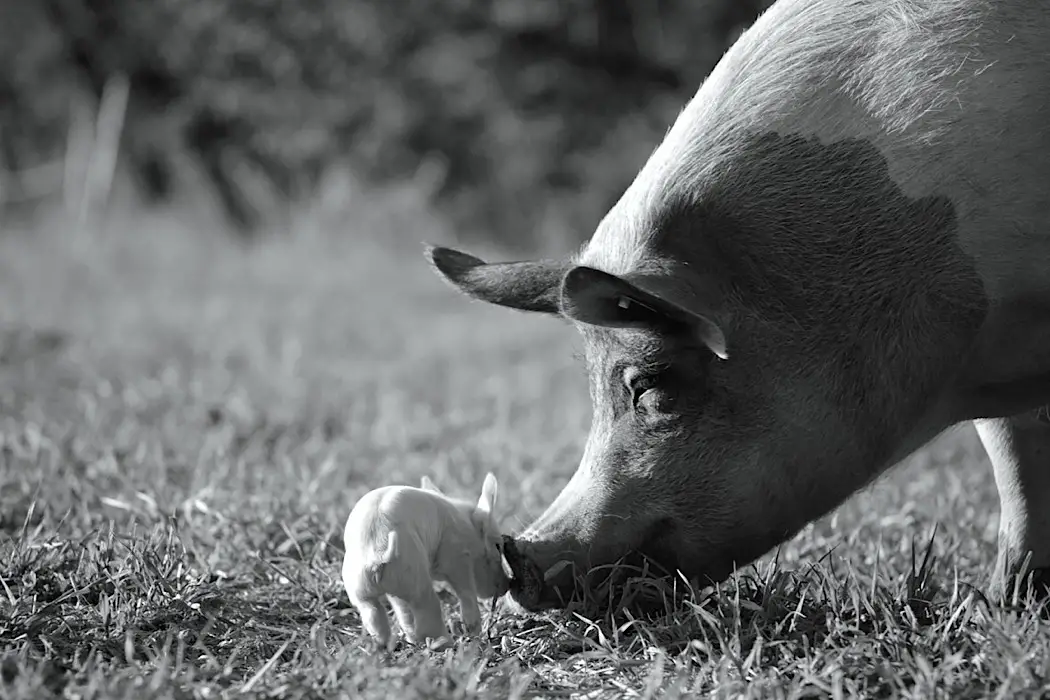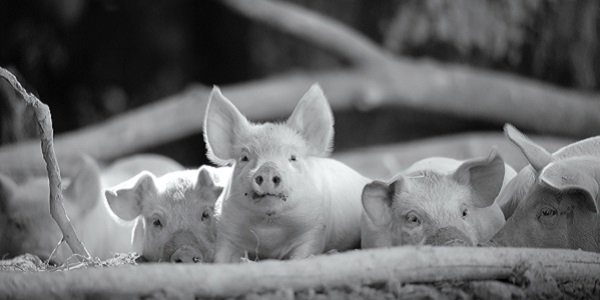GUNDA: A Pig’s Life in Black and White

Lee Jutton has directed short films starring a killer toaster,…
When documentary filmmaker Victor Kossakovsky was a child, he befriended a pig. Eventually, the pig was slaughtered and served for New Year’s Eve dinner, and Kossakovsky was so distressed that he became a vegetarian on the spot. Yet his latest film, Gunda, is not the piece of vegan propaganda that you might expect from such a man (or from executive producer and celebrity vegan Joaquin Phoenix). Named for the mama pig who is the film’s central character, Gunda never ventures inside the bloody walls of a slaughterhouse to make its point about why we should value animals as sentient beings; rather, it avoids the easy shock and awe of such brutality in favor of simplicity and beauty.
Some Pig
The story of Gunda and her litter of piglets, and their neighbors on the farm in Norway where they live—we also briefly visit with some cows and chickens—is told without color, music, or subtitles of any kind. It is cinema boiled down to its barest form: stark black and white images backed by only the ambient sounds of the farm. Because the film is stripped of such frills as a musical score that could elicit gross sentimentality or a voiceover that could attempt to anthropomorphize Gunda and her kin, one is forced to reckon with the animals themselves and come to terms with the fact that, while these creatures are not the same as us, they have more in common with us than we would care to think.

In the film’s opening scenes, Gunda gives birth, squealing shrilly as one piglet after another comes tumbling into the straw and sun. Despite one disturbing scene in which she accidentally steps on one of her babies, it is clear that Gunda does care for them, the same way a human mother or father would care for their children. She guides the scrambling babies around the farm, nudging them with her weighty head; when it is time for them to eat, she readily lies down and presents herself as a living milk bar. The gorgeous cinematography courtesy of Kossakovsky and Egil Håskjold Larsen highlights every hair on her floppy ears and every wrinkle on her aged face; her deep eyes are not human eyes, yet they still contain a great deal of feeling, especially when she is watching her babies. One cannot be sure, but one feels that this is not the first litter that Gunda has shepherded into the world.
Farm Life
The narrative storytelling in Gunda is essentially nonexistent; the camera follows these animals around in their daily lives on the farm, but not much happens apart from them moving from one side of a field from another with breaks for food in between. Yet it’s the way the animals are shot—so surprisingly intimately, yet with a sense of wonder—that makes watching them fascinating even when they aren’t doing much of anything at all. At one point, the camera leaves Gunda and her family to follow a raggedy one-legged chicken as it hops past the fence around the farmyard into the wider world; the chicken is shot at a low angle that renders it almost as epic as Godzilla, scaly foot rising and falling to crush the grass underfoot. And in one of the film’s more touching moments, the piglets stick their muzzles outside the door of the barn to lap giddily at the falling raindrops, seemingly overjoyed by this simple diversion.

While Kossakovsky and company, as previously noted, avoid forcing any kind of message down our throats with this elegant style of filmmaking, that isn’t to say there aren’t moments that have the potential to crush you. The film’s ending is not violent, but it is painful to witness and highlights the emotional life contained within creatures like Gunda. And in watching her, it is hard to imagine anyone justifying themselves in eating her. I have recently cut down on the vast majority of animal products, including pork, in an attempt to live a healthier and more morally justifiable life; if I weren’t already doing this, I cannot imagine watching Gunda and not feeling compelled to do so.
Conclusion
Sparing us a heavy-handed lecture, Gunda shows, rather than tells, us why we should value animals for more than just their meat, and is all the more powerful for it. I’m not sure it will be widely seen enough to spark a serious changing of minds among meat-eating moviegoers, but if you do watch the film, it is guaranteed to make a lasting impression.
What do you think? What are your favorite films about the animal kingdom? Share your thoughts in the comments below.
Gunda opens in select theaters in the U.S. on April 16, 2021. You can find more international release dates here.
Watch Gunda
Does content like this matter to you?
Become a Member and support film journalism. Unlock access to all of Film Inquiry`s great articles. Join a community of like-minded readers who are passionate about cinema - get access to our private members Network, give back to independent filmmakers, and more.
Lee Jutton has directed short films starring a killer toaster, a killer Christmas tree, and a not-killer leopard. Her writing has appeared in publications such as Film School Rejects, Bitch: A Feminist Response to Pop Culture, Bitch Flicks, TV Fanatic, and Just Press Play. When not watching, making, or writing about films, she can usually be found on Twitter obsessing over soccer, BTS, and her cat.













